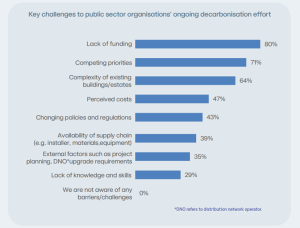Table of Contents
Article Details
Pagabo’s newest white paper reveals conflicting attitudes and approaches from public sector buyers around the challenges and achievability of decarbonisation targets.
Published at the end of last month, Pagabo’s decarbonisation white paper has provided key insight into attitudes towards the UK’s net zero journey from public sector professionals.
For example, the government’s Clean Power 2030 Action Plan has set targets for 95% of the UK’s electricity to derive from clean sources by the end of the decade. In November, the Prime Minister announced that the UK would achieve 81% reduction in carbon emissions by 2035.
It is likely this target will only be achievable with contracts secured through tenders, framework agreements and dynamic purchasing systems and significant uptake and commitment from public sector organisations.
We provide details of data from Pagabo’s white paper, alongside our assessment and perspective on the government’s aims and targets.
Statistics and results from the white paper
Based on results from 171 professionals involved in public procurement across the country from 147 public organisations, statistics generated from Pagabo’s white paper come from various industries and sectors. As an overview, the results are detailed below.
Low confidence in 2035 emissions target
In total, 65% of subjects polled believed the 2035 emissions reduction target is not achievable, or not achievable within the stipulated timeframe. Confidence intervals are also split geographically, with social housing in areas with limited specialist supply chains – such as the South West – holding particularly pessimistic views on the target.
Barriers to net zero strategies
Importantly, public sector organisations are beholden to their own net zero targets and strategies – either set by their own devolved government, or aligning with central government strategies. 59% of public sector stakeholders indicate there are barriers in place to achieving targets which are a significant hindrance to meeting the 2035 goal.
A further 13% say there is no strategy, action plan or target date in place and, overall, only 17% indicate they are fully embracing all opportunities to achieve net zero targets. Ultimately, while there are barriers to strategies regarding resourcing and capacity, these largely come down to the cost of decarbonisation and lack of funding.
Cost and price as considerations
As a fairly new and specialised industry, decarbonisation is not a cheap service to procure or deliver. Installations must be delivered to Trustmark and PAS 2035:2023 standards to be eligible for relevant funding, such as the Warm Homes Social Housing Fund.

Key challenges identified by public sector professionals (Pagabo)
Lack of directly employed resource of professional retrofit roles for contracting authorities means that suppliers are keen to invest in new decarbonisation retrofit divisions and can submit tenders with healthy profit margins.
As such, procurement professionals are looking for ‘quick wins’ to properties – including a fabric first approach through internal and external wall insulation, solar panel investment and LED lighting. However, these quick fixes may not be enough to meet the 81% reduction target in lieu of whole property decarbonisations.
Split opinion on government support
Many local and sub-central authorities, such as housing associations, acquire funding through external, central government funding to supplement or replace their own budgets.
- 40% of procurement professionals say funding opportunities are unclear
- 69% who have applied for funding experienced challenges during the process
- 50% are not actively seeking funding for future decarbonisation projects.
Again, regional gaps and shortfalls often occur, with Wales and Northern Ireland in particular expressing limited awareness of funding opportunities and options.
How social value fits in to sustainable procurement
Pagabo further included a section within the white paper around social value and sustainability, underscoring the importance of these themes within public sector bids and tenders. Encouragingly, most poll respondents indicated that social value and sustainable practices are still an integral part of the tender process:
- 55% of organisations are tracking or monitoring social value, underscoring the importance of monitoring, measuring and reporting progress against commitments
- 78% of buyer organisations ‘consider’ sustainability in procurement activity – which means there are likely to be quality questions around environmental or sustainability management systems.
However, 75% of respondents indicate cost outstrips sustainability ‘most’ or ‘all’ of the time when procuring decarbonisation works and services. With such a large majority admitting cost takes priority, this risks relegating social value as a ‘nice to have’ within the tender process, potentially eliminating the positive social, environmental and economic impacts it creates.
Our position on public sector decarbonisation and retrofit
Pagabo’s white paper concludes with the message that public sector will play an outsized role in leading decarbonisation efforts, and seeks to become a strategic partner in the UK’s path to net zero.
At Executive Compass, our bid writing experts have supported numerous clients to achieve key contract wins for decarbonisation and retrofit tenders and framework agreements. In addition to the recommendations outlined by Pagabo at the conclusion of their white paper, we would add the following recommendations:
- Increased market engagement events for contracting authorities and prospective suppliers, ensuring they can avail themselves of available funding and are aware of standards required to bid for work – aligning with increased scope for pre-market engagement within the Procurement Act 2023
- Considering regional disparities in both knowledge of decarbonisation with contracting authorities and skills gaps in delivery for specialised supply chains – as discussed in Parliament earlier this year.
- Continued consideration of social value and sustainability when issuing decarbonisation tenders, ensuring this remains a central component of procurement given the positive impact on local authority residents, businesses and areas.
To book a free 30 minute consultation and find out how we can support you to acquire key decarbonisation and retrofit contracts, contact us today at info@executivecompass.co.uk or via telephone 0800 612 5563.
